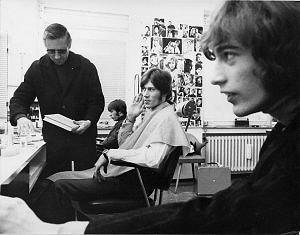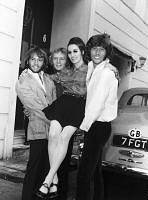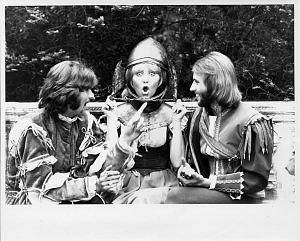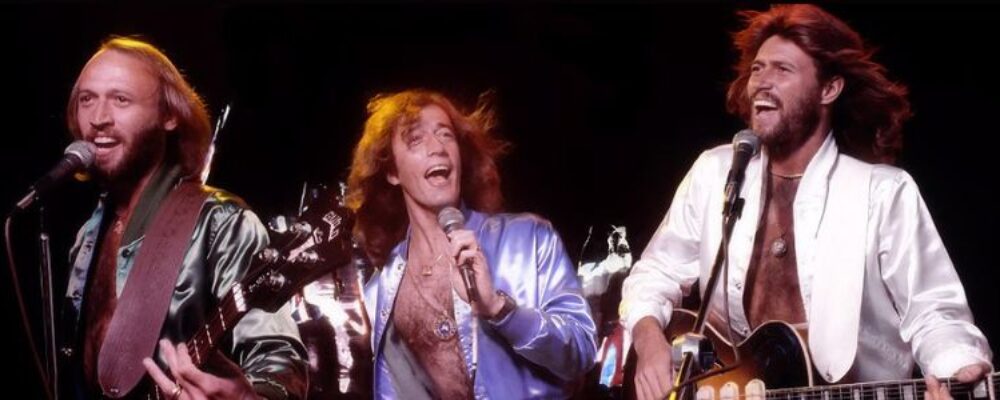Legends : Bee Gees

Copyright 1999. VH1 incorporated
Transcription Copyright 2002 by Janel Clayton Miller.
SEGMENT 3
NARRATOR: There was a crisis when the two non-Gibb band members, Vince and Colin, were almost forced out of the country. Being native Australians, their temporary visas had run out and they were about to be deported. Once again, master mediamind Robert Stigwood stepped in. He staged an assault on the immigration office. Bee Gees fans chained themselves to Buckingham Palace and picketed the Prime Minister’s home. Eventually the musicians were allowed to stay. Stigwood was the Bee Gees’ godfather.
ROBIN: He was the first one to champion us when we got to the UK. And remember in those days there were thousands and thousands of groups, artists trying to make it when we arrived in England. It was overwhelming. We met the right man at the right time, he believed in us and he was a very powerful man.

LIP OF “WORLD”, SUNG BY THE BEE GEES
NARRATOR: As their popularity grew, the Bee Gees set out on a successful world tour and continued to release a steady stream of hits.
CLIP OF “I’VE GOT TO GET A MESSAGE TO YOU”, SUNG BY THE BEE GEES.
NARRATOR: In 16 months, the Bee Gees’ lives changed completely. They made three albums and had nine hit singles. They got famous, they got money, they got girls, and they got crazy.
CLIP OF “IDEA”, PERFORMED BY THE BEE GEES
NARRATOR: It was all great, but it was all too much. After the third Bee Gees’ album was released in the summer of 1968, guitarist Vince Melouney left the band. As the group entered the studio to begin work on their fourth album, tensions rose. Problems between the brothers emerged.
BARRY: ( off camera ) We were not friends anymore. We were still brothers but we couldn’t get along with each other.
NARRATOR: The three brothers, who had been inseparable all of their lives, were now living on their own with money to burn.
BARRY: Everybody suddenly developed an ego, which hadn’t happened before.
Clip of “Indian Gin And Whiskey Dry” performed by The Bee Gees.
BARRY: Success sort of took its toll. It was too much money too soon.
MAURICE: ( laughs ) I had six Astin Martins’ and seven Rolls Royces before I was 21. That’s how quickly I went through that period. So it gives you an idea of what it was like getting instant fame.
NARRATOR: Drug experimentation only added to their problems. ‘Everyone was popping pills in the business,’ Barry said. It became a normal at that point.
BARRY: ( 1981 ) It was the flower-power period. There wasn’t anybody you knew that wasn’t on some form of drugs.
MAURICE: ( 1981 ): Actually what it was at one time was Barry’d be smoking pot, Robin was on pills, and I’d be drinking. So it was pilly, potty, and pussy throughout the business.
NARRATOR: Each brother had his own group of hangers-on, telling them he was the real star of the Bee Gees and the British press got involved in the squabbling.
MAURICE: Oh, that was like an argument really between really Barry and Robin. I was sort of stuck in the middle. And instead of talking to each other on the phone, they would talk to each other via the reporters, you know. So I would go back and say this about one, one week, the next week the other would answer him whether he knew if it was true or not.
BARRY: I believe the first time you become famous I think is a very dangerous time. You believe what people say about you, you believe your press.
ROBIN: Too much happened so fast that we lost kind of communication between the three of us. We found ourselves, going on doing a show, and there’d be a show booked in Los Angeles, two of us would show up, the other one wouldn’t, or one of us would leave on the plane and go home. It was just madness really.
CLIP OF “LAMPLIGHT”, PERFORMED BY THE BEE GEES
NARRATOR: The arguments reached a head in March of 1969. Robin wanted the group’s next single to be a song called “Lamplight”. Barry wanted “First of May”.
CLIP OF “FIRST OF MAY”, PERFORMED BY THE BEE GEES
NARRATOR: Barry won the argument. Robin quit the band. Although the group was still committed to their five-year contract with Robert Stigwood, Robin was released and allowed to go solo.
CLIP OF “SAVED BY THE BELL”, PERFORMED BY ROBIN GIBB
NARRATOR: The Gibb family said Robin was out of control, indulging in drugs and spending too much money. Father Hugh Gibb took drastic measures and set out to make his 20-year old son a ward of the court.
ROBIN: ( 1969 ) Not that you can ever do it. He cannot have. You know I’m a married man, I’ve got my own life, and carrying my own career.
NARRATOR: With their money stopped, Robin and his new wife Molly became even more isolated from the rest of the Gibb family.
OFF-CAMERA REPORTER: ( 1969 ): Is Robin in any sense a prisoner in his own home?
MOLLY GIBB: ( 1969 ) No, it’s ridiculous. He’s perfectly free to go out and come in whenever he likes.
OFF-CAMERA REPORTER: ( 1969 ) Now his father, Mr. Gibb, is said to be concerned Robin’s welfare and his finances. Are you satisfied that everything’s all right?
MOLLY GIBB: ( 1969 ) Of course I am. Otherwise you know I wouldn’t be behind Robin.
NARRATOR: The Gibb family had splintered into fractions. The brothers had stopped communicating. Robin was estranged from everyone.
MAURICE: I mean, it wasn’t a good feeling. It was, it was, I can’t explain it, I know, it was, it was like half of me was gone. Well, he’s my twin. But there was that feeling I never had before that the other half of me was gone. Something was missing.
CLIP OF “TOMORROW TOMORROW”, SUNG BY THE BEE GEES
NARRATOR: Barry, Maurice and Colin continued as the Bee Gees with sister Leslie filling in for Robin’s vocal at one performance. The scaled down version of the group appeared in Robert Stigwood’s slapstick comedy movie, “Cucumber Castle”.
BARRY ( FROM “CUCUMBER CASTLE” ): My friends, my cucumber and I, welcome you.
CLIP OF “NEW YORK MINING DISASTER 1941”, SUNG BY THE BEE GEES
NARRATOR: While filming the movie Colin had a falling out with Barry and Maurice and was fired. By the end of 1969, Barry and Maurice had called it quits as well.

CLIP OF “I STARTED A JOKE”, SUNG BY THE BEE GEES
NARRATOR: The 60’s were over, and so everyone thought, were the Bee Gees.
CLIP OF “I STARTED A JOKE”, SUNG BY THE BEE GEES
SEGMENT 4
“MY WORLD” PERFORMED BY THE BEE GEES
NARRATOR: The Bee Gees began the 1970’s divided. The group had disbanded and Barry, Maurice and Robin weren’t speaking to each other.
ROBIN: I think Maurice suffered it most, because he never left anyone. I left, then Barry left, then suddenly Maurice was on his own, you know, Maurice was left without a group. He hadn’t gone anywhere. He’d shown up at the recording studio but he was the only one.
NARRATOR: Maurice had married Scottish pop singer Lulu and they were busy negotiating the demands of managing two musical careers with a personal life.
MAURICE: We were the couple of the year, we had it filmed on TV, thousands of fans were outside the church, and it was all beautiful. We were married six years and it lasted five. The last year I can say was hell. It was basically, well, we were so young looking back at it. But the whole thing was just a party.
NARRATOR: At a time when both their careers were in limbo, Maurice and Lulu lived impetuously.
MAURICE: It was just clubbing into Tramps in London, staying there until four in the morning, go to the Common Hotel for breakfast, going home, next day get up, meet at the pub at 12 and drink until 6, that was what you did everyday. And I became a full-blown alcoholic through it. ( laughs )
NARRATOR: The brothers weren’t communicating. But they had to see each other at business meetings. They missed being together. But someone had to have the nerve to say it out loud.
ROBIN: I actually made the first move. I called Barry who was on holiday in Spain and said ‘let’s get together’. But it was not easy, it was more like quickly, it was easy when it happened. Three months after I first called him ‘let’s go into Dean Street where the studios were and make some more songs.’
CLIP OF “LONELY DAYS”, SUNG BY THE BEE GEES
End of part 2

